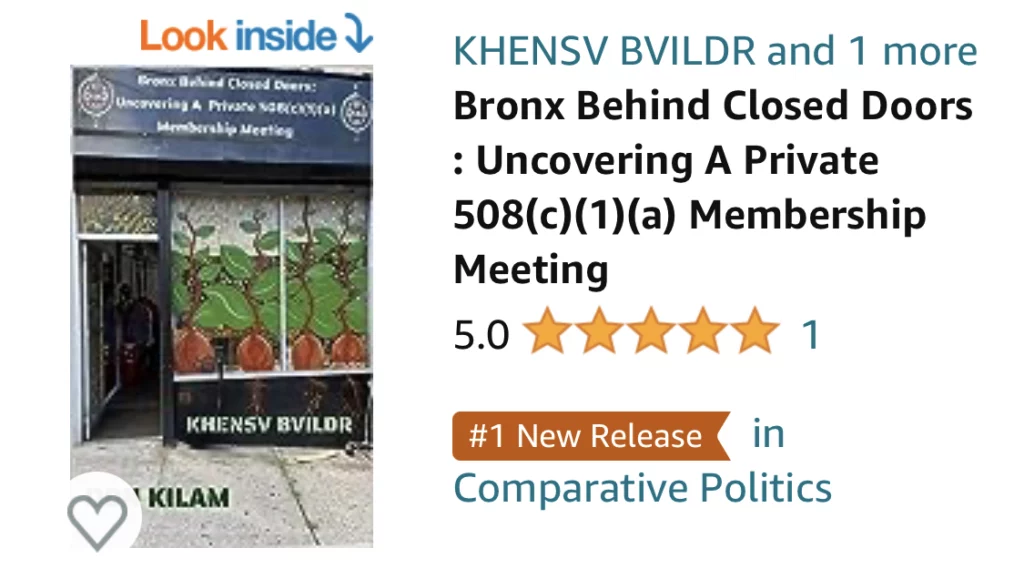Introduction
In the bustling streets of the Bronx, New York, a discrete gathering takes place—an intimate and private meeting held by a unique 508(c)(1)(a) ministry. This private ministry embraces an unconventional belief system, encouraging the use of cannabis flowers as a sacrament for spiritual upliftment. Recently, parts of this intriguing meeting have been captured in a groundbreaking new release book by KHENSV BVILDR and DON KILAM, titled “Bronx Behind Closed Doors: Uncovering A Private 508(c)(1)(a) Membership Meeting.”
The Significance of Privacy for Faith-Based Organizations
Privacy is a fundamental aspect of our lives, and for faith-based organizations operating under the 508(c)(1)(a) designation, safeguarding privacy becomes even more vital. The Internal Revenue Service (IRS) recognizes the significance of privacy for these organizations, offering specific protections to ensure their confidential information remains secure. In this article, we will explore the privacy safeguards provided by the IRS for 508(c)(1)(a) faith-based organizations, enabling them to operate with a sense of confidentiality and trust.
Understanding 508(c)(1)(a) Faith-Based Organizations
A 508(c)(1)(a) designation refers to a faith-based organization that operates under section 501(c)(3) of the Internal Revenue Code. These organizations, often rooted in religious or spiritual beliefs, engage in activities such as worship, religious education, and charitable work. The IRS recognizes the need to protect the privacy of such organizations due to the sensitive nature of their operations and the potential impact disclosure of their information might have on their members and supporters.
Confidentiality of Form 1023
When applying for tax-exempt status, 508(c)(1)(a) faith-based organizations must complete Form 1023, also known as the Application for Recognition of Exemption Under Section 501(c)(3) of the Internal Revenue Code. The IRS treats the information provided on this form as confidential, ensuring that sensitive details about the organization’s structure, activities, and finances remain secure. This confidentiality protects the organization’s privacy during the application process.
Non-Disclosure of Donor Information
Donor privacy is a paramount concern for faith-based organizations, as individuals may wish to keep their contributions confidential for personal, religious, or other reasons. The IRS recognizes this need and strictly prohibits the disclosure of donor information. Contributions made to 508(c)(1)(a) faith-based organizations are generally not subject to public disclosure, protecting the privacy of donors and fostering an environment of trust.
Limited Disclosure of Information
While the IRS respects the privacy of 508(c)(1)(a) faith-based organizations, there are instances where limited disclosure of certain information is required. For example, public inspection of certain documents, such as the organization’s annual information returns (Form 990), is mandated by law. However, the IRS takes measures to redact sensitive information before making these documents available to the public, further safeguarding the privacy of the organization and its constituents.
Confidentiality in Audits and Investigations
In the event of an audit or investigation by the IRS, faith-based organizations can expect the same level of privacy protections as any other entity. The IRS maintains strict confidentiality protocols during these processes, ensuring that sensitive information is handled with care and remains confidential. This allows organizations to cooperate with the IRS while maintaining the privacy of their operations.

“Bronx Behind Closed Doors”: Exploring Alternative Legal Structures and Private Arrangements
“Bronx Behind Closed Doors” delves into the world of alternative legal structures and private arrangements, offering a fresh perspective on how individuals can interact with government and public systems while adhering to their unique beliefs and principles. The book sheds light on various unconventional practices, challenging traditional norms in favor of personalized approaches.
Unconventional Practices Explored in the Book
The narrative presented in the book showcases a range of unorthodox methods and approaches to legal frameworks and private arrangements. It introduces readers to the practicality of private automobile titles and surety bonds, emphasizing their potential benefits. Additionally, the authors present the intriguing concept of using W-8BEN forms over birth certificates, demonstrating how alternative documentation can be utilized within the confines of the law.
Private Tradelines and Holding Company Structures
One of the book’s focal points is the establishment of private tradelines through UCC filings. This innovative approach to financial management opens doors to new possibilities, enabling individuals to navigate the financial landscape with greater autonomy and control. The authors also shed light on the advantages of setting up a record label within a holding company structure, financed by whole life insurance policies for artist advances. Furthermore, they explore how placing an automobile in a trust can offer benefits such as asset protection and efficient estate planning.
Navigating Unconventional Paths Responsibly
While “Bronx Behind Closed Doors” provides invaluable insights into alternative legal structures and private arrangements, it underscores the importance of seeking professional advice when venturing into these unconventional paths. Compliance with applicable laws and regulations is paramount, and expert guidance can ensure individuals navigate these uncharted territories responsibly and ethically.

Conclusion
The IRS recognizes the importance of privacy for 508(c)(1)(a) faith-based organizations and has implemented safeguards to protect their sensitive information. From the confidential treatment of Form 1023 to the non-disclosure of donor information, these protections enable faith-based organizations to operate with peace of mind and maintain the trust of their members and supporters. While limited disclosure may be required in certain circumstances, the IRS upholds the privacy of these organizations during audits and investigations. By preserving privacy, the IRS fosters an environment where faith-based organizations can thrive and fulfill their missions while respecting the confidentiality of their operations.
“Bronx Behind Closed Doors: Uncovering A Private 508(c)(1)(a) Membership Meeting” serves as an intriguing guide for those interested in exploring unorthodox approaches to legal frameworks and private arrangements. This thought-provoking book challenges conventional thinking and presents readers with a fresh perspective on interacting with the government and public systems. As individuals seek to align their beliefs and principles with their legal obligations, this book opens up new possibilities and encourages responsible exploration of alternative paths.









